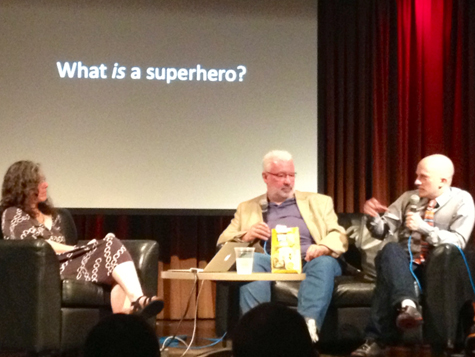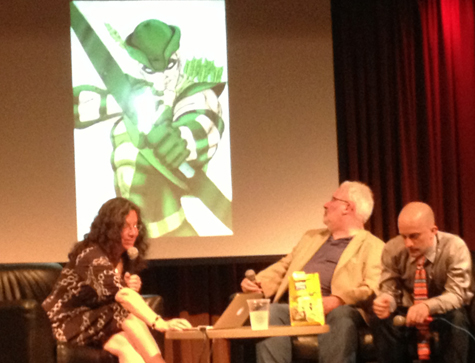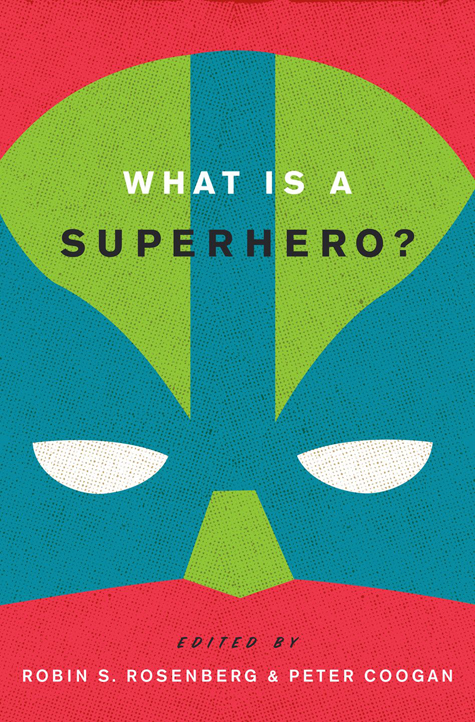“All of this philosophical stuff makes my hair hurt,” remarked veteran superhero scribe and former Marvel Editor-in-Chief Tom DeFalco; “That’s why I lost mine,” affirmed educator and comics scholar Geoff Klock. We all know baldness is the superpower of the smartest characters on both sides of comics’ crisp line between good and evil, from Charles Xavier to Lex Luthor, and serious study was the mark of a sincere love of this simple artform at the panel discussion “What is a Superhero?” at the Tribeca location of New York City’s influential cultural institution 92Y last week.
The good-humored and well-considered panel was the kind of event worth skipping retailers’ weekly New Comic Day for. DeFalco and Klock—two contributors to the book What is a Superhero?—and Dr. Robin S. Rosenberg—the book’s co-editor—discussed the social and psychological underpinnings of this strange and uniquely modern form of fantasy, and what it means to differing generations of enthusiasts.
DeFalco drew a distinction between the superhero, who traditionally does good whether it rewards him or herself or not and sticks to standards that distance these figures from the forces they’re fighting, and the pulp hero, who is so deep in the battle with wrongdoers that this contrast is blurred: “Have you read the Shadow novels? The villain kills four or five people, and then the Shadow kills about 45 people.”
DeFalco, Klock, and Rosenberg lamented this trend of bullying and recklessness in movies like Man of Steel (though I think that point is more complex, too), and Klock qualified that “It’s difficult to determine where to set the boundaries” between genres because the pop melting-pot makes so many of them overlap—“comics come out of pulps, samurai movies were turned into Westerns,” and Westerns supplied the pattern for a lot of formative sci-fi.

Klock theorized that the superhero was the urban icon of masculinity, while the cowboy was the rural one—though both these mythic worlds and the hyper-gender roles they represent are the stuff of bygone eras rather than an idealized future. Asked by Rosenberg about the place of superheroines, DeFalco suggested that male readers traditionally favored combat while female fans related to the kind of conflict-resolution that defined his own Spider-Girl (which, modesty aside, was an uncommonly humanistic super-saga that lasted 100-plus issues).
This was a contentious distinction to some women in the audience, including one follower of writer Kelly Sue DeConnick’s popular (and conventionally kickass) current Carol Danvers/Captain Marvel series, whose success neither DeFalco nor Klock offered an explanation for (though the recent admission of women to combat in the U.S. military, and both the character’s and the writer’s background in that world, may have something to do with it).
In general, though, Klock and DeFalco felt that these are difficult days for heroes of any kind. “Once you get past [age] 14 or 15, you have a hard time accepting heroes in real life,” remarked DeFalco, and Klock noted that “all prestige television is about antiheroes”—from Mad Men to Breaking Bad—with “alpha males struggling against a collapsing patriarchy.” Still, DeFalco said, “When I sit down to write, it’s my job to dive into that fantasy [of heroes doing the right thing for its own sake], and believe it, and embrace it and convince all of you guys that this is possible.”
He went on to assert that most of the “dark” hero movies (with the considerable exception of the three most recent Bat-flicks and Man of Steel) have proven nowhere near as commercially successful as the generally upbeat (and multiplex-ruling) Marvel franchises—though Klock pointed out the subtle incorporation of this vigilante/paragon tension into the Avengers movie, in which we first see a demoralized and troubled Captain America, hiding from the modern world, who “has to be talked into being a hero—probably because he heard about Vietnam and saw the Dark Knight trilogy.”

While the two speakers agreed, in answer to Rosenberg’s question about the role of physical aggression in the superhero archetype, that “comics are built for colorful action” (DeFalco) and that vigilante heroism provides necessary ingredients of the genre—“not playing by the rules ups the drama” (Klock)—they also insist that a sense of consequence is what humanizes superhumans. “It has to cost them something to go out and do this,” DeFalco offered, with Peter Parker’s crushing family commitments and personal conflicts as an example. “That’s why Green Lantern is terrible,” added Klock. “He’s this golden-boy pilot, whose girlfriend is a millionaire, and he already has everything, PLUS a magic ring—it’s terrible storytelling.”
We regular humans need to strive and probably want our role models to have to as well, a verisimilitude in even this fanciful artform that may have prompted an audience question to Rosenberg, a professional psychologist, about how accurate she finds the psychological subtext of superhero motivations. She explained, “any good fiction has two important elements: the writer was a really good observer of human behavior, and they’re able to communicate it in a perceptive way,” which makes pop writers with good instincts and mass insight a kind of “lay psychologist.”
At the start of the evening Rosenberg showed a series of slides and asked the audience which figures were or were not superheroes. Opinion was emphatic that Buffy was and the Shadow wasn’t, and that Kick-Ass-esque real-life vigilantes weren’t but doctors volunteering in disaster-ravaged Haiti were. But the crowd seemed split on some people doing their everyday jobs in extraordinary circumstances, from the 9/11 firefighters to Sully Sullenberger. Perhaps because we prefer our fantasy figures to be the epitome of what we wish for, while thoughtful studies like Rosenberg’s allow for our fallibility, and work at defining what makes us the humans we can truly hope to be.
Adam McGovern’s dad taught comics to college classes and served as a project manager in the U.S. government’s UFO-investigating operation in the 1950s; the rest is made up. There is material proof, however, that Adam has written comicbooks for Image (The Next issue Project), Trip City.com, the acclaimed indie broadsheets POOD and Magic Bullet, and GG Studios, blogs regularly for HiLoBrow.com and ComicCritique and posts at his own risk on the personal site Fanchild. He lectures on pop culture in forums like The NY Comics & Picture-story Symposium and interviewed time-traveling author Glen Gold at the back of his novel Sunnyside (and at this link). Adam proofreads graphic novels for First Second and Holt, has official dabblings in produced plays, recorded songs and published poetry, and is available for commitment ceremonies and intergalactic resistance movements. His future self will be back to correct egregious typos and word substitutions in this bio any minute now. And then he’ll kill Hitler, he promises.











A really terrific summation of a wide-ranging evening, Adam.
I disagree with the comments about Green Lantern. This is the same laziness writers block themselves with when dealing with Superman. IT doesn’t matter if Green Lantern is really technically all powerful. There is plenty of drama and conflict to write about. The real problem is writers are lazy and just want simple “bash the villian” storylines with a little anguish thrown in to make the character “real”. They have gotten so used to superhero tropes that they avoid looking at real possibilities. I am relectant to give my insights here for free. Why should I? I can think of many real issues for Green Lantern to deal with that have never even been addressed, instead they just portray him as far weaker than he should be.
I tend to agree with you on Green Lantern, @nude007 — it’s pretty standard that Hal Jordan feels an anxious need to prove himself, which stems directly from how advantaged he is to begin with. This has been the core of his character both in stories I hated (like the GL movie) and in ones I loved (like Darwyn Cooke’s New Frontier comic). Though I can kinda float outside the upper atmosphere of the controversy since I have no emotional investment and find GL comics so unreadable these days; they’ve become like DC’s X-Men in terms of intricate endless continuity that’s hypnotic for those who like it and both unfathomable and monotonous to those who don’t (like me). On the subject of privilege, though, the GL mantle, folklorically speaking, is something that’s meant to be lost — Abin Sur passes it on to Hal and Hal passed it on to a series of others (John Stewart, Kyle Rayner et al.). DC makes the GL franchise about how many tentacled and purple-skinned action-figures can wear the suit, but the dramatic substance is in how the responsibility gets passed down and passed along. That of course would require a focus on individuals rather than a numbing cast of millions.
Hal has been portrayed lately as a needy person, but the character as he was originally was strong, solid and his problem was that he DIDN’T need people. He was sufficient unto himself. To me, the whole “without fear” thing was ridiculous to start with. We NEED fear. What they really wanted was a guy who doesn’t quit and does the right thing no matter what distractions or emotions get in the way. Determined or stuborn is how I see the character is supposed to be.
I am with you on reading comis. I find none of them worthy descendants of the title. Comics have been really screwed up for the last 20 years, imo, starting when hey began to make everyone be a dark, pissed off asshole who channels his murderous tendencies on bad guys, mostly, but still has enough vitriol to spew venom at others, especially team mates. There are no real heroes any more.
Okay, I said there was no reason to give up my ideas on GL, but what the hell?
GL should be approached as a guy used to being and doing everyting for himself successfully. As I said, he is stubborn and self sufficient. Then he gets a ring that can do anything without effort. The temptation would eat at him. first, he starts doing things that are hard for him using the ring, soon he’s creating food, washing his clothes and manipulating people to get what he wants. The play on GL should be the TEMPTATION of the ring. A calm, level headed guy suddenly given total power. absolute power corrupts. It is a constant battle for him to not become a mad god. THIS is how Hal should have become a bad guy, not some manipulation by an evil entity. Face it, GL should be able to defeat anyone, as long as he beleives his constructs or energy beam CAN, they WILL be sufficient. That is why you choose a guy like him. Hal would oscilate between wanting to maintain his self-reliance, doing everything for himself, and teh constant temptation of having the ring do EVERYTHING. That is the totally ignored secret of GL, and why they keep wanting to write him as needy.
Poor writing gets us a GL where his shields fail and his attacks are too weak. Nonsense. use the character fully and learn how to write. No one should be able to steal his ring either. Even if they did, he would still control it. DC heroes should mostly be gods struggling with being gods and trying to hang onto their humanity. They would naturally become warped a bit around the edges, but still good people trying to do good things. Superheroes should be their own worst enemies, ruining their personal lives, but when action calls, they are unstoppable. It was always HOW superman won that made him interesting, just like Iron Man. GL used to be the same way. All heroes need to get off this arrogant asshole trip. no wonder readership has dropped so much.
A very interesting take on the underlying workings of these characters’ personalities, @nude007 (and sorry I don’t seem to get notified of additions to my own threads and this answer was delayed — how do these computers expect to become our overlords if they can’t even keep up with their emails?). Though if you’d enjoy a hero who walks both a metaphorical and literal tightrope between his good tendencies and his bad impulses, I highly recommend Mark Waid’s current Daredevil; definitely post-angst, along with books like Fraction & Allred’s FF and the new Young Avengers.
It strikes me as profoundly self-indulgent to characterize the notion of ‘superhero-dom’ as a wholly modern literary archtye; Homeric verse and the Zarathurstian ‘uber-mensch’ deliniate the core concept that underpins all of these charcters.
Modern superheros have, by and large, tacked on whatever socio-psychological hubris was permeateing the patiarchioshpere at the time of their conception to a charcter that is, at it’s core, a cardboard cut-out dipped in magic fairy water leaving a little physical or emotional heel visible for his counterpoint to prey on.
Modern superheors are certainly interesting and creative but to appropriate them wholly for the modern age is disengenious. Thor says no.
Who was assuming they were entirely modern, @samslade? It’s much more fashionable (and, I agree, accurate) to re-market them as updated archetypes…love your Achilles analogy. Even so, I think Plato is the more accurate model than Campbell (who is more modern :-)) — Plato realized that what the earth and its inhabitants’ imaginations have to offer is a rough impression of what he called forms and we would call archetypes, and a somewhat devalued coin it is in superheroes’ case…though worth the 25 cents I used to pay for it, and even a pretty good buy for the inflationary amount today…